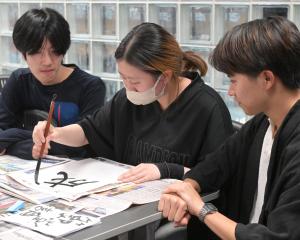The Fijian marine scientist said it would be "an odd sensation", but one she would quickly forget when it came time to walk up to the University of Otago graduation stage and receive her PhD in marine science.
"I wear lots of wetsuits and flippers at work, so it’s definitely going to be an odd sensation to put heels on.
"If I’m not in flippers, I’m usually in my gumboots or Crocs. They are all very different to heels."

"It’s nice to be at this stage, finally. It hasn’t really sunk in yet.
"Graduating as the first Pacific student in marine science is very dear to me, as I want to be able to positively encourage and influence females and other Pacific Islanders."
Her PhD thesis focused on an endemic New Zealand red seaweed (Adamsiella) that is unique because it grows in soft sediments.
The research explored the physiology and assemblages of Adamsiella beds in Otago Harbour and found it plays an important role in the marine environment as an "ecosystem engineer".
It created a habitat that supported other seaweeds and organisms to live in, she said.
At the end of her undergraduate degree in 2019, she returned to Fiji where she worked as a UN-Habitat resilience officer for the Lautoka City Council.
She said the job involved working with six of the most vulnerable informal settlements in Lautoka, with the aim of improving their resilience in the face of increasing risk posed by climate change.
Her work was recognised by the University of Otago with an Otago 20Twenties Award for alumni students who are trailblazers, challenging the status quo to make a better future for everyone.
She said taking the plunge into marine science had opened many doors and allowed her to explore a wide range of coastal ecosystems, from the vibrant coral reefs of Fiji to the seaweed-rich waters of Otago Harbour, Fiordland and Stewart Island.
Rather than returning to the tropical climes of Fiji, Miss Chand hopes to do research work at the University of Otago involving coastal connections and Pacific communities.












